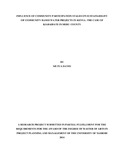| dc.description.abstract | The difficulty of water accessibility is particularly acute in rural areas and small communities, where water collection may require hours of physical effort, water sources may be contaminated, or must be purchased at rates too expensive to allow for proper health and hygiene. It has been observed that the rural areas perform consistently worse than urban areas inaccessibility of clean water. In rural areas, where 78% of the national population lives, only 38% to 52% have easy access to safe water; in urban areas 59% to 83% have easy access to safe water. Tigania west Sub-County which is the scope of this study is part of the rural Kenya and therefore is faced by the problem of insufficient access of safe water to a majority of the population.
The study was concerned in establishing the influence of community participation on the sustainability of Community Based Water Projects in Kenya with specific reference to Kiabaibate Water Project in Meru County. The main objective was to dig into the characteristics of the membership and the management approaches and techniques with a view to seeing how best they contribute to the sustainability of the project.
The main concern here was to ascertain whether community participation contributes to the sustainability of Community Based water projects. In trying to unravel this issue the researcher intended to use descriptive survey design and sampled respondents from both the members of the water project and the management team. The sampling method was random sampling method of 30% members and project committee of Kiabaibate water Project.
The instrument of data collection is the questionnaire that was administered directly by the researcher as guided. Data was analyzed using descriptive statistics and inferential statistics: Frequency distributions and measures of central tendencies, and the results of the survey presented using tables.
The information gathered will enable communities understand the nature of CBWPs and further support Management committees, Government and donors in adding value to the way in which they engage with the CBWPs. The research equally puts in a voice to many other academic opinions that makes project execution a learning process. | en_US |

